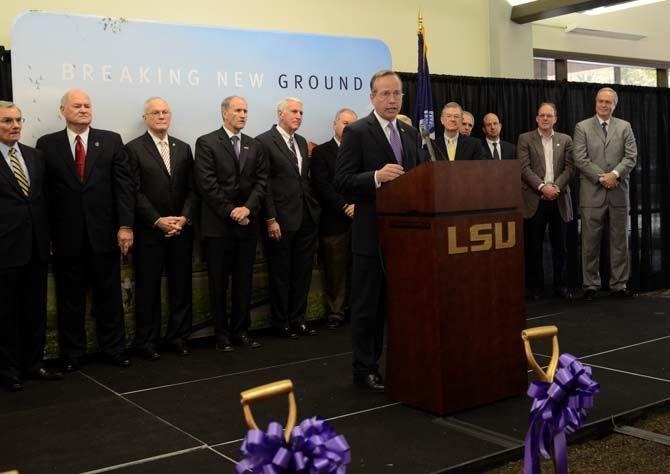Leaders from the LSU System’s 10 institutions descended on the nation’s capitol Tuesday to present the system’s data, research and priorities to policymakers to campaign to support higher education.
LSU President F. King Alexander said the flagship campus receives about $500 million in funding from the federal government each year in grants and student aid — five times the amount received from the state government.
According to the LSU Office of Budget and Planning, funding from the state and federal government make up about 30 percent of the University’s operating budget.
“If you think about it the main campus gets about $100 million from the state right now,” Alexander said. “If these budget cuts go through, that will drop to about $50 million, so we probably ought to be doing this about every week.”
Last February was the first time LSU System chancellors traveled to Washington, D.C., as a collective team, an initiative led by Alexander who experienced a similar practice as president of California State University, Long Beach.
“I learned this routine through what we did in California, where our 23 presidents would go and join the chancellor or the president of the system up in Washington for a couple of days,” Alexander said. “In Kentucky, it was a free-for-all, like it used to be here. That’s probably how it works in about half the states”
The system office of Texas A&M University said the chancellors of university system visit the Capitol separately, and at the University of Alabama, just the president of university system visits Washington, D.C., to meet with the Alabama delegation their office said.
If the institution chancellors go separately, Alexander said, each unit of the system isn’t aware of the agenda of the other members or who they talk to. This year, the LSU System has a strategy.
Alexander said the system chancellors will first meet with senators, who represent all of Louisiana and then break out into groups who will visit congressmen from their districts.
“Wednesday is the day we hit our congressional delegation,” Alexander said. “We have our federal priorities booked. We consolidated efforts because we are advocating for the same things. Certain congressional representatives on the house side are more receptive to what’s going on in Shreveport than they are in New Orleans, and those in New Orleans are more receptive to our institutions in New Orleans than they are Shreveport, so it helps to go together.”
The LSU AgCenter, for example, will meet with the Department of Agriculture because the United States Farm Bill, which governs much of the U.S. agriculture industry, is important for how the center operates, Alexander said.
Wednesday will end with a dinner for all LSU alumni working in Washington, D.C., Alexander said.
Last January Alexander also traveled to Washington D.C. for a White House summit on college affordability.
LSU President leads chancellors to visit Louisiana delegation in Washington D.C.
March 3, 2015
LSU President F. King Alexander speaks at the breaking ground ceremony for the renovations for Patrick F Talyor on November 17, 2014.
More to Discover









